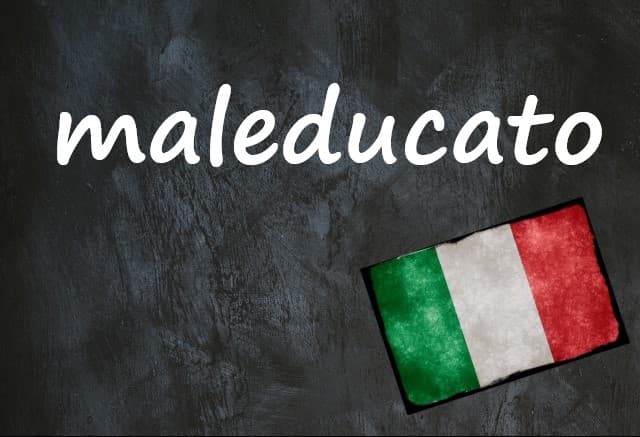Italian word of the day: 'Maleducato'

It's only polite to learn this word.
"Maleducata!"
A voice resounded from the other side of the particularly crowded Roman tram I was riding, in the tone of righteous indignation that Italians have mastered like few others.
Thankfully the term wasn't directed at me: maleducato (for a male) or maleducata (female) means 'rude' or 'bad-mannered'.
As my fellow passengers squabbled loudly over whether someone had pushed someone else, and as I exchanged exasperated eye rolls with the woman next to me and breathed a private sigh of relief not be involved, I thought about just how damning a term maleducato is.
It essentially means 'badly brought up', so it's an implicit diss on your parents too.
Se i bambini sono maleducati, la colpa è dei genitori.
If children have bad manners, it's the parents' fault.
In its most condemnatory form – the one used by the irate passenger on my tram – un/a maleducato/a means 'a yob' or 'a lout': you use it as an insult to imply that someone is categorically, irreversibly a rude person.
Sei proprio un maleducato!
You're a real yob!
You can soften the tone slightly by telling someone they're acting rude, rather than that they are rude. You say that with the construction fare il maleducato.
Ora stai facendo la maleducata.
Now you're just being rude.
Dai, non fare il maleducato.
Come on, don't be rude.
Of course, maleducato has an opposite we can all aspire to: educato, 'polite' or 'well-mannered'.
È una ragazza molto educata.
She's a very polite girl.
And with that in mind, I made sure to say permesso ('excuse me') and grazie ('thank you') as I squeezed my way off that tram.
See our Word of the Day archive here. Do you have a favourite Italian word you’d like us to feature? If so, please email us with your suggestion.
Make sure you don’t miss any of our Italian words and expressions of the day: download our new app (available on Apple and Android) and then selecting the Italian Word of the Day in your Notification options via the User button.
Comments (1)
See Also
"Maleducata!"
A voice resounded from the other side of the particularly crowded Roman tram I was riding, in the tone of righteous indignation that Italians have mastered like few others.
Thankfully the term wasn't directed at me: maleducato (for a male) or maleducata (female) means 'rude' or 'bad-mannered'.
As my fellow passengers squabbled loudly over whether someone had pushed someone else, and as I exchanged exasperated eye rolls with the woman next to me and breathed a private sigh of relief not be involved, I thought about just how damning a term maleducato is.
It essentially means 'badly brought up', so it's an implicit diss on your parents too.
Se i bambini sono maleducati, la colpa è dei genitori.
If children have bad manners, it's the parents' fault.
In its most condemnatory form – the one used by the irate passenger on my tram – un/a maleducato/a means 'a yob' or 'a lout': you use it as an insult to imply that someone is categorically, irreversibly a rude person.
Sei proprio un maleducato!
You're a real yob!
You can soften the tone slightly by telling someone they're acting rude, rather than that they are rude. You say that with the construction fare il maleducato.
Ora stai facendo la maleducata.
Now you're just being rude.
Dai, non fare il maleducato.
Come on, don't be rude.
Of course, maleducato has an opposite we can all aspire to: educato, 'polite' or 'well-mannered'.
È una ragazza molto educata.
She's a very polite girl.
And with that in mind, I made sure to say permesso ('excuse me') and grazie ('thank you') as I squeezed my way off that tram.
See our Word of the Day archive here. Do you have a favourite Italian word you’d like us to feature? If so, please email us with your suggestion.
Make sure you don’t miss any of our Italian words and expressions of the day: download our new app (available on Apple and Android) and then selecting the Italian Word of the Day in your Notification options via the User button.

Join the conversation in our comments section below. Share your own views and experience and if you have a question or suggestion for our journalists then email us at [email protected].
Please keep comments civil, constructive and on topic – and make sure to read our terms of use before getting involved.
Please log in here to leave a comment.